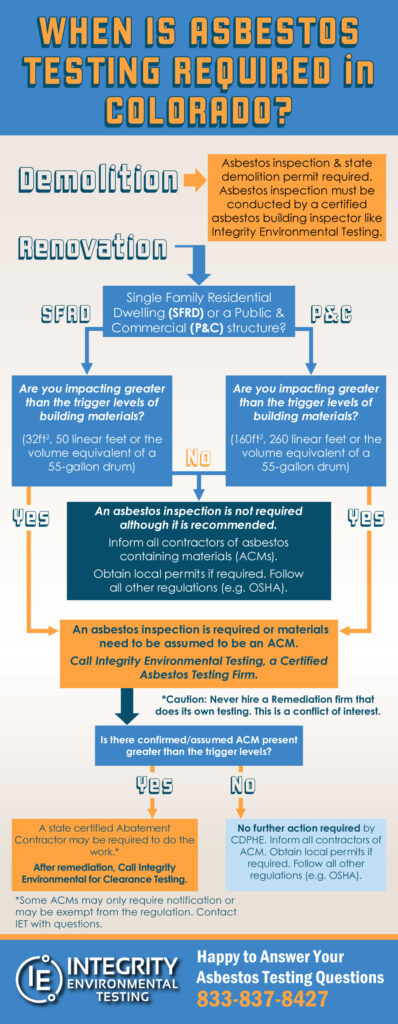
Bottom line: If you don’t know it’s not asbestos, you must test.
Are you embarking on a renovation or demolition project in Colorado? Whether you’re sprucing up your space or starting from scratch, it’s critical to be aware of state and federal regulations regarding asbestos.
Here’s what you need to know to avoid penalties and ensure compliance.
Understanding Asbestos
Asbestos, once glorified for its fire-resistant properties and versatility, poses significant health risks when disturbed. Found in common building materials such as ceiling textures, vinyl floor coverings, insulation, and roofing products, asbestos fibers, if inhaled, can cause serious respiratory illnesses, including mesothelioma and asbestosis.
Asbestos Testing is Key during Renovation and Demolition Projects
Before commencing any work, it’s essential to have your project inspected for asbestos by a certified asbestos inspector in Colorado. Even newly constructed buildings may have some asbestos-containing materials, which emphasizes the importance of thorough inspection regardless of a structure’s age. The rule is that if you don’t know, it must be tested.
What are the Trigger Levels for Asbestos?
If the amount of asbestos-containing material to be disturbed exceeds trigger levels an abatement contractor must remove the material. Certified removal contractors, known as General Abatement Contractors, are trained in safely removing regulated asbestos-containing materials before renovation or demolition activities.
What are the Legal Consequences?
Read about Asbestos Regulations in US Schools.
Notification and Disposal of Asbestos-Containing Materials (ACMs)
Written notification to the Colorado Department of Public Health and Environment (CDPHE), along with a notification fee and a ten-working-day waiting period, is required before the removal of regulated asbestos-containing materials. Additionally, regulated asbestos-containing waste material must be disposed of at approved asbestos waste disposal sites to prevent environmental contamination. Abatement companies are not the only ones held responsible when these regulations aren’t followed.
Demolition Procedures when Asbestos is Present
Whether you’re demolishing a structure or performing destructive salvage, thorough inspection for asbestos is mandatory. Any necessary asbestos removal must be conducted by a certified General Abatement Contractor before demolition. Even if no asbestos is found during the inspection, notification to the CDPHE is required before demolition can proceed.
During Demolition
Recycling of materials bonded or contaminated with asbestos-containing material is not permitted. Special precautions must be taken to prevent asbestos-containing materials from becoming friable during demolition activities, including avoiding crushing or pneumatic jacking of materials.
Asbestos regulations are in place to safeguard public health and the environment. Here’s a comprehensive document on Colorado Asbestos Regulations. See page 7 for more information.
For more information on handling and disposal, see this helpful Boulder County guidance.
For reliable asbestos testing and environmental solutions, trust Integrity Environmental Testing. Contact us today to schedule an inspection and ensure your project meets regulatory requirements while prioritizing safety. Don’t risk asbestos exposure – let us help you create a safer environment for your home or business.

Call for Asbestos Testing or with Questions


